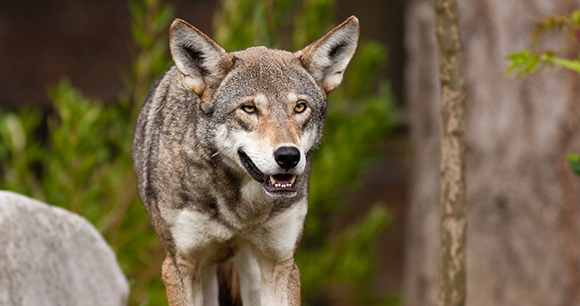Using Fecal Samples to Noninvasively Study Wolves
by Samuel Hervey, Michigan Technological University
Noninvasive genetic tools are commonly used in conservation programs because they help practitioners address practical questions—such as estimating population size and reconstructing ancestries—without having to use stressful capture methods. Wolves across North America have benefited substantially from the use of noninvasive genetic methods, and the insights provided have helped wildlife managers make the best-informed decisions regarding population persistence.

Using funds from an AWI Christine Stevens Wildlife Award, we developed new, noninvasive genetic panels to monitor two wolf populations—the gray wolves (Canis lupus) of Isle Royale National Park and red wolves (Canis rufus), a species formerly spread throughout the southeastern United States.
By 2018, the Isle Royale wolves had become functionally extinct due to inbreeding, with only two wolves remaining, unable to produce viable young. To address this, 20 wolves were reintroduced to the island, with noninvasive monitoring used to track inbreeding and reproduction.
Red wolves were declared extinct in the wild in 1980. In 1987, a small number of red wolves were reintroduced into the wild in North Carolina from a population under human care. Given the very small founding population, they are similarly threatened by inbreeding, and are additionally impacted by hybridization with coyotes.
Both populations benefitted from the use of noninvasive microsatellite genotyping in the past, but now, new sequencing methods present a more reliable genotyping method. We sought to design a novel noninvasive genotyping method that uses single nucleotide polymorphisms (SNPs)—genetic variants found throughout the genome—from collected feces to study both wolf populations. SNPs are more easily genotyped in ways that allow different labs to objectively compare results. Because SNPs are found throughout the genome, we can select just the few hundred of them (an “SNP panel”) that are most informative toward our questions of interest.
For Isle Royale wolves, we have used SNP panels to identify individuals, differentiate canids, and reconstruct pedigrees. What is most exciting is that nearly half the population has been identified noninvasively through scat, hair, and urine samples, and many wolves have been genetically “re-captured” on multiple occasions, allowing us to track them through time. As the Isle Royale wolf population continues to breed, our noninvasive genetic tool will ensure effective, real-time assessment of inbreeding and track when future conservation action may be warranted to avoid the fate of the previous population.
We are using our red wolf ancestry panel to track the persistence of red wolf genetics across portions of their historic range along the Gulf Coast of Louisiana and Texas. Previous findings demonstrated that coyotes in this region have red wolf ancestry. Our noninvasive sampling will identify where red wolf genetics exist and the habitats associated with red wolf ancestry, which can help us manage and conserve these features moving forward. We collected scat on Galveston Island, Texas, and confirmed many coyotes contained greater than 10 percent red wolf ancestry. Further, the Galveston Island population does not appear to suffer from inbreeding, something in direct contrast to the wolves of Isle Royale.
This study was funded by the Christine Stevens Wildlife Awards program. To learn more about this program or to view additional studies, click here.
Program Terms: Terrestrial Wildlife
AWI Quarterly Terms: Feature Article
Related News
IUCN Reaffirms Long-Tailed Macaques’ Endangered Status Despite Industry Pressure
In Program: Terrestrial WildlifeThe International Union for Conservation of Nature (IUCN) today released an update to its Red List of Threatened Species. The update revealed that the long-tailed...
AWI Funds Research to Alleviate Human-Wildlife Conflicts, Animal Suffering
In Program: Terrestrial WildlifeThe Animal Welfare Institute (AWI) announced today the eight recipients of its Christine Stevens Wildlife Award who are developing humane solutions to human-wildlife conflicts and...
Refuge from Cruel Trapping Act Reintroduced to Protect Wildlife and Pets on Public Lands
In Program: Companion Animals, Terrestrial WildlifeThe Animal Welfare Institute (AWI) endorses the Refuge from Cruel Trapping Act, reintroduced today in the US House of Representatives by Rep. Jerrold Nadler (D-NY)....
Colorado Now Leads Country in Comprehensive Approach to Fighting Wildlife Trafficking
In Program: Terrestrial WildlifeToday, Colorado Gov. Jared Polis signed S.B. 25-168 into law to combat wildlife trafficking. The bipartisan legislation, which is unique among states for the number...